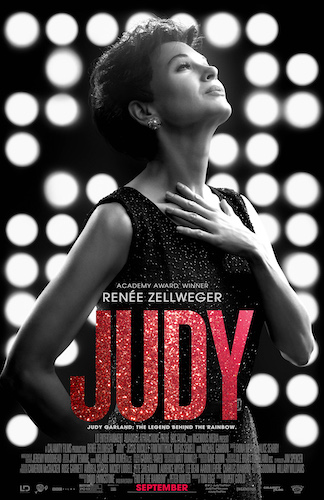Judy
Let’s not beat around the bush. You’ve got to see this for the triumphant, official return of Renée Zellweger, who turns in what may be her best performance to date. Better than Bridget Jones. Better than Chicago. Even better than her Oscar winning turn in Cold Mountain. As Judy Garland in this otherwise typical biopic, Wellweger is an absolute sight to behold. So, that’s all well and good. I think many people could predict that this film would be anchored by this performance. How is Judy outside of its Judy?
Well, it’s just passable. The leap between time periods doesn’t do quite enough for what director Rubert Goold may have been trying to achieve. You have three different stages of Garland’s life: her rise as an abused child star, the early years of motherhood, and her 1969 London gigs that were notoriously maligned. As if all of these memories were tossed into the fire that kindles her struggles, Garland faces all of these horrors head on. As history reminds us, the majority of Garland’s career was plagued by behind-the-scenes issues that mostly came to light during these live performances. The rumours were true. Judy Garland had personal demons.
Judy Garland with her two young children, having to bring them bad news.
So, early Judy Garland was the limelight of a child star that blocked out the personal hell she went through. Latter Judy Garland was the talent being cloaked by the booing crowds, challenging headlines, and an unforgiving world when it came to her times of need. Judy really goes all in with the second idea, but I wish it did more with the first. We get some song and dance numbers that remind us why Judy Garland was celebrated to begin with, but I wish we got a bit more of that movie magic as well: the illusion that Hollywood clung to in order to hide their faults, and push aside a child that just wanted to follow her dreams. Judy also tries to play the safe game, so all of the focus on only the bad also feels held back. We’re going to analyze Garland’s darkest hours, mostly with a mainstream, by-the-numbers lens. It’s a bit stunting.
However, we have Renée Zellweger to save the day, as you already know. Her quirkiness is the perfect ingredient to bring Garland’s own mannerisms back to life. Her usually put-on expressions compliment Garland’s persona. However, Zellweger — I feel — has always been undermined when it comes to the subtleties she tosses in amongst the more obvious reactions and glares. In Judy, you can find something new each time you look. Second-guessing thoughts. The reminder of a bad memory. The realization of a scenario. Zellweger tells you how she literally feels by her facial gestures, but you discover so much more of what she is hiding by the small cracks in her armour. It’s performance gymnastics by a star that we haven’t seen much of for years (and this is a more-than worthy return).
Renée Zellweger’s performance is easily a highlight of 2019, and it can lead her all the way down the awards race.
When it comes to Garland’s musical numbers, Zellweger dominates these too. When Garland puts on a more well rehearsed show, Zellweger is there to sculpt cinematic memories. When Garland crumbles on stage, Zellweger exudes enough fragility to make the entire scene feel invasive. By the end, we see Oscar worthy moments that balance a thousand different (and conflicting) feelings, ideas, and thoughts, and they’re all bottled up inside one doe-eyed icon that is tired of having the world dismiss her at every second. Zellweger could find herself with another golden Oscar statue, this time for Best Actress. I wouldn’t be surprised, and I would absolutely not doubt that she will be in the running from now on.
Otherwise, Judy is mostly safe. It starts off rather stale, but the final forty minutes does a better job at bringing the shadows of these darkest hours to life. Garland lets her shield down more often, you get a stronger idea of how the world was treating her, and you see how self destructive Garland truly was. Of course, most of these positives come from Zellweger’s leading performance, but it’s nice that the film picks up and chases after her at this point. Stay with the film, and you’ll get your money’s worth. You’re there for Renée Zellweger. You’re going to be blown away. Don’t let the slow start dismay you.
Andreas Babiolakis has a Masters degree in Film and Photography Preservation and Collections management from Ryerson University, as well as a Bachelors degree in Cinema Studies from York University. His favourite times of year are the Criterion Collection flash sales and the annual Toronto International Film Festival.






